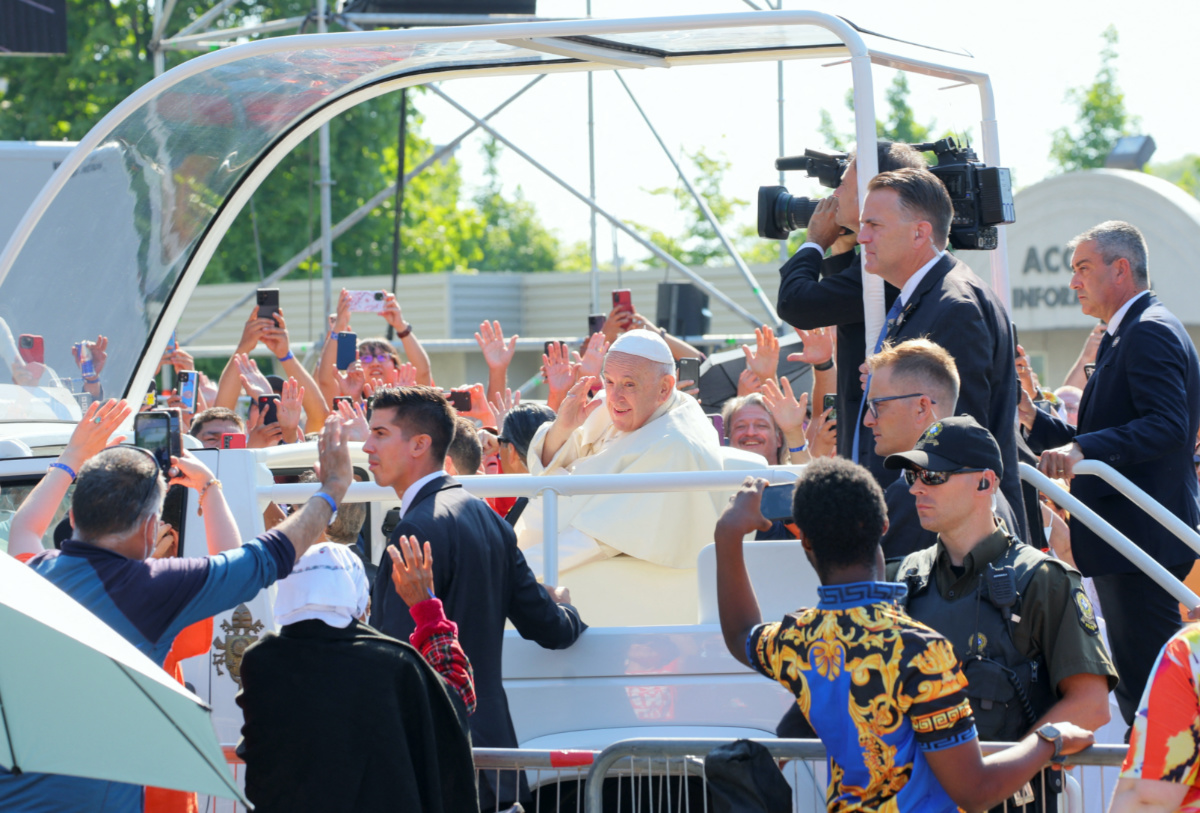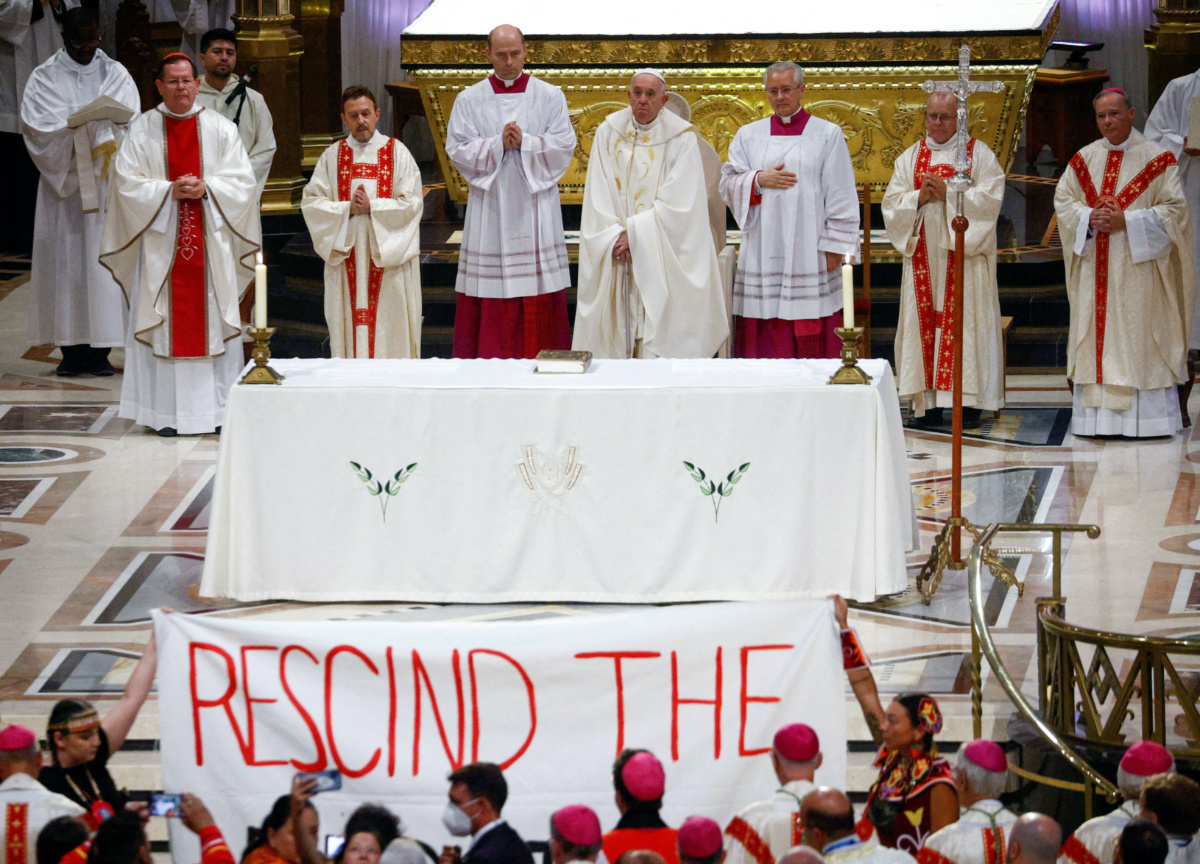Updated: 11:45am (AEST)
Sainte-Anne-De-Beaupre, Quebec, Canada
Reuters
Pope Francis on Thursday asked for forgiveness for sexual abuse at Canadian schools for Indigenous children run by Catholic orders, addressing a deep wound that many survivors wanted him to acknowledge during his apology tour in Canada.

Pope Francis greets the faithful before presiding over a Mass at the Shrine of Sainte-Anne-de-Beaupre, one of the oldest and most popular pilgrimage sites in North America, in Sainte-Anne-de-Beaupre, Quebec, Canada, on 28th July. PICTURE: Reuters/Christinne Muschi.
At an evening vespers service with priests and nuns in the Quebec City cathedral, the Pope said the Church in Canada was on a new path after being “devastated by the evil perpetrated by some of its sons and daughters.”

People hold a banner as Pope Francis presides over a mass at the Shrine of Sainte-Anne-de-Beaupre, one of the oldest and most popular pilgrimage sites in North America, in Sainte-Anne-de-Beaupre, Quebec, Canada, on 28th July. The banner reads: “Rescind the doctrine”. PICTURE: Reuters/Guglielmo Mangiapane.
POPE FRANCIS MASS INTERRUPTED BY PROTEST OVER 15TH-CENTURY DOCTRINE JUSTIFYING LAND GRAB
Participants at Pope Francis’s Mass in Canada on Thursday unfurled a banner asking him to formally rescind edicts from the 15th century in which the papacy justified taking Indigenous land.
The large banner protesting the Doctrine of Discovery was unfurled near the front row facing the congregation as the Pope was starting Mass in a cathedral outside Quebec City. Most of the people in the church were Indigenous.
Two women held up the banner, written on a white sheet with red and black letters, and later took it down themselves.
It was not clear if the Pope, who was behind the banner, was able to see what it said.
The Doctrine of Discovery was enshrined in 15th-century papal bulls, or edicts. Indigenous people in Canada have been calling for its rescinding for years. In 2015, Canada’s Truth and Reconciliation Commission, which spent six years investigating residential schools, listed its repudiation as one of 94 calls to action that it laid out.
A spokesperson for papal visit organisers said Canadian bishops are asking the Pope to address the Doctrine of Discovery.
“Galvanized by the calls of our Indigenous Partners, and by the Holy Father’s remarks, we are working with the Vatican and those who have studied this issue, with the goal of issuing a new statement from the Church,” Laryssa Waler wrote in an email Thursday.
“Canada’s Bishops continue to reject and resist the ideas associated with the Doctrine of Discovery in the strongest possible way.”
Massimo Faggioli, a professor of theology and religious studies at Villanova University, said the Pope was unlikely to formally rescind the doctrine but he should address it.
“The church doesn’t operate like that – it doesn’t issue a document saying, ‘Now we have decided that this old doctrine is no longer true,'” he said. “How the church does that is to produce new documents with new doctrines that replace old doctrines…I believe [the Pope] should address that issue, and I think he will. But not with a formal document.”
Canadian Prime Minister Justin Trudeau also “discussed the need to…address the Doctrine of Discovery” in a meeting with the pontiff on Wednesday, according to a readout from his office on Thursday.
– PHILIP PULLELLA and ANNA MEHLER PAPERNY/Reuters
“I think in particular of the sexual abuse of minors and vulnerable people, scandals that require firm action and an irreversible commitment,” the Pope said on the penultimate day of his six-day visit to Canada.
“Together with you, I would like once more to ask forgiveness of all the victims. The pain and the shame we feel must become an occasion for conversion: never again!”
It was the first time the Pope specifically addressed the issue of sexual abuse at the schools, where more than 150,000 Indigenous children were separated from their families and brought to between 1870 and 1996.
The children were starved or beaten for speaking their native languages and many sexually abused in a system Canada’s Truth and Reconciliation Commission called “cultural genocide”.
The comments build on a historic apology by the Pope on Monday in the town of Maskwacis, the site of two former schools, when he called the church’s role in the schools, and the forced cultural assimilation they attempted, a “deplorable evil” and “disastrous error.”
But that apology, while evoking strong emotion and praise as a first step in reconciliation, was also criticised by survivors for falling short of what they had hoped for. Lack of a mention of sexual abuse was among their grievances.
“Deep dismay”
Since then, the Pope has continued to elaborate on his apology and has alluded to institutional failure by the church in allowing abuse to run rampant at the schools – addressing another criticism by survivors.
Earlier on Thursday, the Pope made some of his strongest comments yet on the collective failure of the Catholic Church over abuse at Indigenous schools.
Presiding at a Mass at the Basilica of Sainte-Anne-de-Beaupre outside Quebec City, the Pope spoke of “the burning questions that this pilgrim Church in Canada is asking”.
“In confronting the scandal of evil and the Body of Christ wounded in the flesh of our Indigenous brothers and sisters, we too have experienced deep dismay; we too feel the burden of failure,” the Pope said.
“Why did all this happen? How could this happen in the community of those who follow Jesus?”
The basilica where the Mass was held is the oldest Catholic pilgrimage site in North America and stands on the site where a small church was built in 1658 to house a statue of St. Anne that French colonists considered miraculous.
About three-quarters of the 1,400 spots inside were given to residential school survivors and other Indigenous people while thousands of others watched on giant television screens outside. Overall, it was the biggest turnout since the Pope arrived.
Psychological counsellors were on hand in case needed by residential school survivors.
Many of the residential schools were run by Christian groups for successive Canadian Governments’ policy of assimilation. Most were run by Catholic religious orders.
Prime Minister Justin Trudeau’s office said in a statement that during his private meeting with the Pope on Wednesday, he discussed the need for the church to “take concrete action to repatriate Indigenous artifacts, provide access to residential schools documents, address the doctrine of discovery, and ensure justice for survivors, including for the Rivoire case.”
Canada wants France to extradite retired priest Johannes Rivoire so he can face a charge of sexual abuse from when he worked with Indigenous in Canada’s North.
Indigenous Canadians have asked the Vatican Museums to return artifacts sent to the Vatican over the centuries by missionaries, including a kayak made of wood and sealskin by the Inuvialuit people of the Mackenzie Delta in the Western Arctic that is believed to be between 100 and 150 years old.
– Additional reporting by STEVE SCHERER, ISMAIL SHAKIL and ANNA MEHLER PAPERNY






